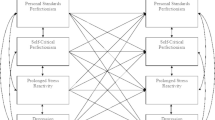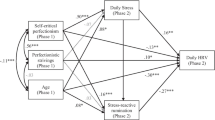Abstract
The present investigation sought to examine the roles of perfectionism and problem solving in the relations between stress-related depressive symptoms in a Chinese adult sample. One hundred and thirty-eighty students in an open university in Hong Kong with a mean age of 28 years participated in the study. After controlling the effectsof life stress, problem solving was shown to have significant main effects on both hopelessness and depressive features, whereas perfectionism was found to have main effects only on the latter variable. In addition, the results indicated that two constructs played a moderating role in the relations between life stress and depressive symptoms and hopelessness. The findings revealed that perfectionism and problem solving were important cognitive–behavioral variables in accounting for variances of psychological distress across cultures. Limitations of the study are discussed.
Similar content being viewed by others
REFERENCES
Alden, L. E., Bieling, P. J., & Wallace, S. T. (1994). Perfectionism in an interpersonal context: A selfregulation analysis of dysphoria and social anxiety. Cognitive Therapy and Research, 18, 297–317.
Beck, A. T., Ward, C. H., Mendelson, M., Mock, J., & Erbaugh, J. (1961). An inventory for measuring depression. Archives of General Psychiatry, 5, 462–467.
Beck, A. T., Weissman, A., Lester, D., & Trexler, L. (1974). The measurement of pessimism: The Hopelessness Scale. Journal of Consulting and Clinical Psychology, 42,861–865.
Chang, E. C. (1998). Hope, problem-solving ability, and coping in a college student population: Some implications for theory and practice. Journal of Clinical Psychology, 54, 953–962.
Cheng, S. K. (1990). Humor, self-efficacy as moderators of life stress and depression. An undergraduate thesis, University of Hong Kong.
Cheng, S. K., Chong, G. H., & Wong, C. W. (1999). Chinese Frost Multidimensional Perfectionism Scale: A validation and prediction of self-esteem and psychological distress. Journal of Clinical Psychology, 55, 1051–1061.
Cheng, S. K., & Lam, D. J. (1997). Relationships among life stress, problem solving, self-esteem, and dysphoria in Hong Kong adolescents: Test of a model. Journal of Social and Clinical Psychology, 16, 343–355.
Cohen, J., & Cohen, P. (1983). Applied multiple regression/correlation analysis for the behavioral sciences (2nd ed.). Hillsdale, NJ: Erlbaum.
D'Zurilla, T. J., & Nezu, A. (1982). Social problem solving in adults. In P. C. Kendall (Ed.), Advances in cognitive- behavioral research and therapy (Vol. 1, pp. 201–274). New York: Academic Press.
Flett, G. L., & Hewitt, P. L. (1995). Personality, life stress, and depressive symptoms: A test of a diathesis- stress model. Current Psychology, 14, 112–126.
Flett, G. L., Hewitt, P. L., Garshowitz, M., & Martin, T. R. (1997). Personality, negative social interactions, and depressive symptoms. Canadian Journal of Behavioural Science, 29, 28–37.
Frost, R., Marten, R., Lahart, C., & Rosenblate, R. (1990). The dimensions of perfectionism. Cognitive Therapy and Research, 14, 449–468.
Goodman, S. H., Gravitt, G. W., & Kaslow, N. J. (1995). Social problem solving: A moderator of the relation between negative life stress and depression symptoms in children. Journal of Abnormal Child Psychology, 23,473–485.
Heppner, P. P., & Petersen, C. H. (1982). The development and implications of a personal problem solving inventory. Journal of Counseling Psychology, 29, 66–75.
Hewitt, P. L., & Dyck, D. G. (1986). Perfectionism, stress, and vulnerability to depression. Cognitive Therapy and Research, 10, 137–142.
Hewitt, P. L., & Flett, G. L. (1991). Dimensions of perfectionism in unipolar depression. Journal of Abnormal Psychology, 100, 98–101.
Hewitt, P. L., Flett, G. L., & Ediger, E. (1996). Perfectionism and depression: Longitudinal assessment of a specific vulnerability hypothesis. Journal of Abnormal Psychology, 105, 276–280.
Hewitt, P. L., Flett, G. L., & Weber, C. (1994). Dimensions of perfectionism and suicide ideation. Cognitive Therapy and Research, 18, 439–460.
Hewitt, P. L., Newton, J., Flett, G. L., & Callander, L. (1997). Perfectionism and suicide ideation in adolescent patients. Journal of Abnormal Child Psychology, 25, 95–101.
Joiner, T. E., & Schmidt, N. B. (1995). Dimensions of perfectionism, life stress, and depressed and anxious symptoms: Prospective support for diathesis- stress but not specific vulnerability among male undergraduates. Journal of Social and Clinical Psychology, 14, 165–183.
Kant, G. L., D'Zurilla, T. J., & Maydeu-Olivares, A. (1997). Social problem solving as a mediator of stress-related depression and anxiety in middle-aged and elderly community residents. Cognitive Therapy and Research, 21, 73–96.
Lazarus, R. A., & Folkman, S. (1984). Stress, appraisal, and coping. Springer: New York.
Nezu, A. M., Nezu, C. M., & Perri, M. G. (1989). Problem solving therapy for depression. New York: Wiley.
Nezu, A. M., Nezu, C. M., Saraydarian, L., Kalmar, K., & Ronan, G. F. (1986). Social problem solving as a moderating variable between negative life stress and depressive symptoms. Cognitive Therapy and Research, 10, 489–498.
Nezu, A. M., & Perri, M. G. (1989). Social problem-solving therapy for unipolar depression: An initial dismantling investigation. Journal of Consulting and Clinical Psychology, 57, 408–413.
Nezu, A. M., Perri, M. G., Nezu, C. M., & Mahoney, D. J. (1987, November). Social problem solving as a moderator of stressful stress among clinically depressed individuals. Paper presented at the meeting of the Association for the Advancement of Behavior Therapy, Boston, Massachusetts.
Nezu, A. M., & Ronan, G. F. (1988). Stressful life stress, problem solving, and depressive symptoms among university students: A prospective analysis. Journal of Counseling Psychology, 35, 134–138.
Priester, M. J., & Clum, G. A. (1993). The problem-solving diathesis in depression, hopelessness, and suicidal ideation: A longitudinal analysis. Journal of Psychopathology and Behavioral Assessment, 15, 239–254.
Sarason, I. G., Johnson, J. H., & Siegel, J. M. (1978). Assessing the impact of life changes: Development of the Life Experiences Survey. Journal of Consulting and Clinical Psychology, 46, 932–946.
Shek, D. L. (1993). Measurement of pessimism in Chinese adolescents: The Chinese Hopelessness Scale. Social Behavior and Personality, 21, 107–120.
Snyder, C. R. (1995). Conceptualizing, measuring, and nurturing hope. Journal of Counseling and Development, 73, 355–360.
Van Houdenhove, B. (1986). Prevalence and psychodynamic interpretation of premorbid hyperactivity in patients with chronic pain. Psychotherapy and Psychosomatics, 45, 195–200.
Vinokur, A., & Selzer, M. L. (1975). Desirable versus undesirable life stress: Their relationship to stress and mental distress. Journal of Personality and Social Psychology, 32, 329–337.
Author information
Authors and Affiliations
Rights and permissions
About this article
Cite this article
Cheng, S.K. Life Stress, Problem Solving, Perfectionism, and Depressive Symptoms in Chinese. Cognitive Therapy and Research 25, 303–310 (2001). https://doi.org/10.1023/A:1010788513083
Issue Date:
DOI: https://doi.org/10.1023/A:1010788513083




